简单句-并列句和复合句用法及习题
简单句并列句复合句
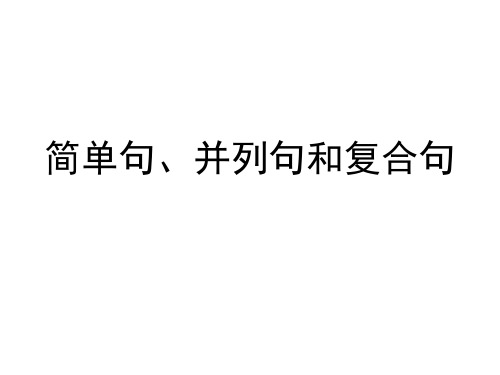
能连接并列复合句的副词
• besides 而且,还有 • hence 由此,因此 • nevertherless然而 • moreoever加之,因此 • otherwise 否则,要不然 • then 然后,于是 • therefore 因此,要不然 • then 然后,于是 • therefore因此,所以 • thus 因而,从而 • i am not feeling very well today, otherwise i would do
• 第四种句型: • 主语+动词+间接宾语+直接宾语 • 如:He brings me cookies every day. • They gave him a watch.
• 第五种句型: • 主语+动词+宾语+宾语补足语 • 如:He asked me to answer this question. • We often see him play basketball alone.
• 如:The old woman lives alone, but she never feels lonely.
• we love peace but we are not afraid of war.
第三种:表示选择关系
• 此类并列连词有or, otherwise, either…or…等。
• 第二种句型: • 主语+动词+宾语 • 如:He loves his wife.
• We will always remember the junior high school life.
• 第三种句型: • 主语+连系动词+表语 • 如:I am a winner. • The music sounds nice. • We are in the classmate.
简单句-并列句和复合句用法及习题
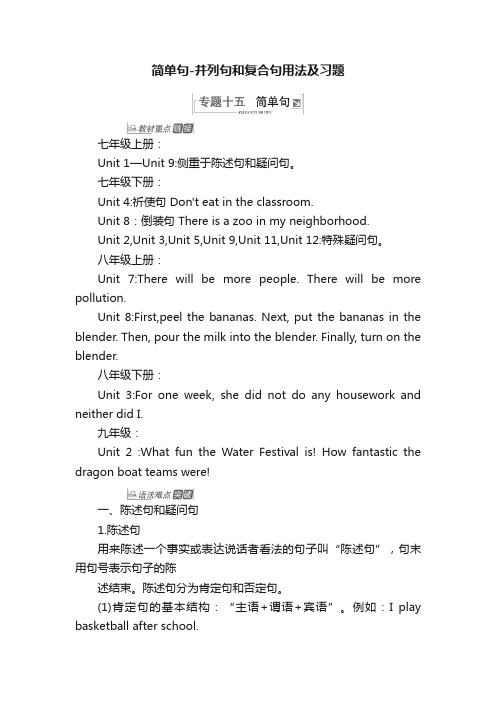
简单句-并列句和复合句用法及习题七年级上册:Unit 1—Unit 9:侧重于陈述句和疑问句。
七年级下册:Unit 4:祈使句 Don't eat in the classroom.Unit 8:倒装句 There is a zoo in my neighborhood.Unit 2,Unit 3,Unit 5,Unit 9,Unit 11,Unit 12:特殊疑问句。
八年级上册:Unit 7:There will be more people. There will be more pollution.Unit 8:First,peel the bananas. Next, put the bananas in the blender. Then, pour the milk into the blender. Finally, turn on the blender.八年级下册:Unit 3:For one week, she did not do any housework and neither did I.九年级:Unit 2 :What fun the Water Festival is! How fantastic the dragon boat teams were!一、陈述句和疑问句1.陈述句用来陈述一个事实或表达说话者看法的句子叫“陈述句”,句末用句号表示句子的陈述结束。
陈述句分为肯定句和否定句。
(1)肯定句的基本结构:“主语+谓语+宾语”。
例如:I play basketball after school.(2)否定句又分为完全否定和部分否定。
①完全否定词有not,no,no one,nobody,nothing,neither,none,never。
例如:None of us have been to Canada.②部分否定词有hardly,seldom,few,little以及not与both,all,each,every,quite,always等连用所表示的部分否定。
高三英语复合句与并列句区分分析练习题40题
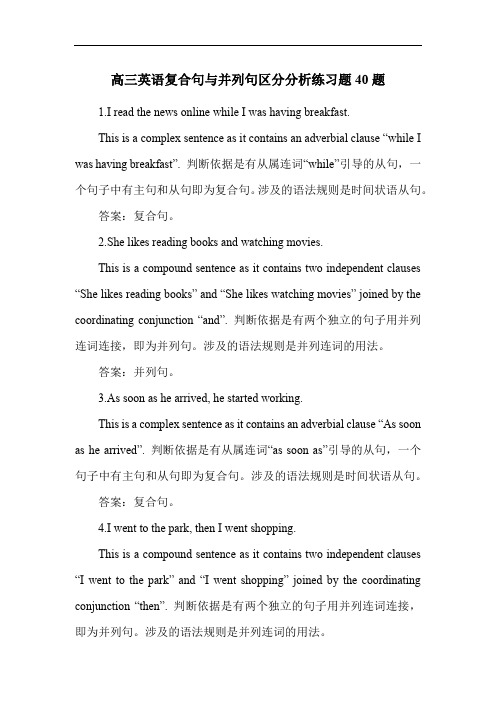
高三英语复合句与并列句区分分析练习题40题1.I read the news online while I was having breakfast.This is a complex sentence as it contains an adverbial clause “while I was having breakfast”. 判断依据是有从属连词“while”引导的从句,一个句子中有主句和从句即为复合句。
涉及的语法规则是时间状语从句。
答案:复合句。
2.She likes reading books and watching movies.This is a compound sentence as it contains two independent clauses “She likes reading books” and “She likes watching movies” joined by the coordinating conjunction “and”. 判断依据是有两个独立的句子用并列连词连接,即为并列句。
涉及的语法规则是并列连词的用法。
答案:并列句。
3.As soon as he arrived, he started working.This is a complex sentence as it contains an adverbial clause “As soon as he arrived”. 判断依据是有从属连词“as soon as”引导的从句,一个句子中有主句和从句即为复合句。
涉及的语法规则是时间状语从句。
答案:复合句。
4.I went to the park, then I went shopping.This is a compound sentence as it contains two independent clauses “I went to the park” and “I went shopping” joined by the coordinating conjunction “then”. 判断依据是有两个独立的句子用并列连词连接,即为并列句。
句子成分、简单句并列句复合句及练习(高考复习完整版)
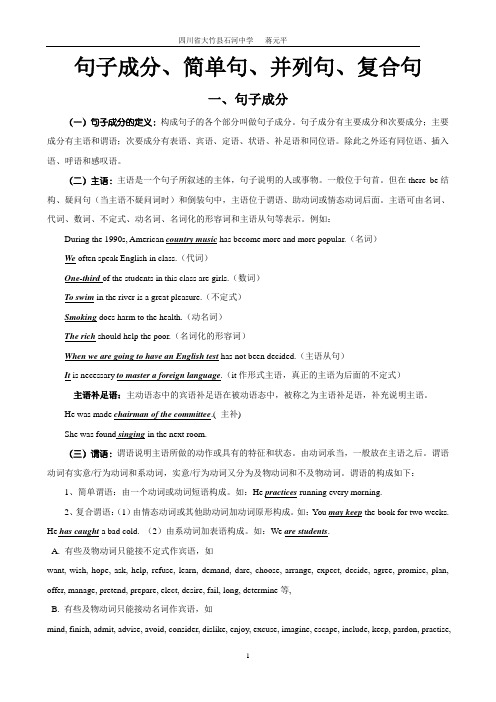
句子成分、简单句、并列句、复合句一、句子成分(一)句子成分的定义:构成句子的各个部分叫做句子成分。
句子成分有主要成分和次要成分;主要成分有主语和谓语;次要成分有表语、宾语、定语、状语、补足语和同位语。
除此之外还有同位语、插入语、呼语和感叹语。
(二)主语:主语是一个句子所叙述的主体,句子说明的人或事物。
一般位于句首。
但在there be结构、疑问句(当主语不疑问词时)和倒装句中,主语位于谓语、助动词或情态动词后面。
主语可由名词、代词、数词、不定式、动名词、名词化的形容词和主语从句等表示。
例如:During the 1990s, American country music has become more and more popular.(名词)We often speak English in class.(代词)One-third of the students in this class are girls.(数词)To swim in the river is a great pleasure.(不定式)Smoking does harm to the health.(动名词)The rich should help the poor.(名词化的形容词)When we are going to have an English test has not been decided.(主语从句)It is necessary to master a foreign language.(it作形式主语,真正的主语为后面的不定式)主语补足语:主动语态中的宾语补足语在被动语态中,被称之为主语补足语,补充说明主语。
He was made chairman of the committee.( 主补)She was found singing in the next room.(三)谓语:谓语说明主语所做的动作或具有的特征和状态。
英语句子类型简单句并列句复合句

Whose与which的换用:
The house whose window is broken is mine. whose=the house’s (window) The house
the window of which is broken of which the window is broken
放在名词或代词后面,由关系代词或关系副词引导的修饰该 名词或代词的从句叫定语从句。被修饰的名词或代词叫先行 词。
Harry Porter is a boy who has magic power.
先行词 关系词
关系代词
定语从句 关系副词 where, when, why
that,which, who, whom, whose示“……的”,是关系代词who、 which的所有格,因此既可指人,也可指物。在从句 中,whose作定语修饰名词,被修饰词可以是从句的 主语、宾语或介词宾语。 They cleaned the house whose windows face south. He is the boy whose pen I borrowed yesterday. The gentleman, with whose daughter I worked, looked down upon women.
关系代词的实质
Join the following sentences:
The girl is Mary. We saw her yesterday.
The girl that/who/whom is Mary.
we saw yesterday
关系代词的基本用法
关系 代词
who
whom which that whose 指代
简单句并列句复合句

句子结构和成分句子分类句子按结构可分为简单句、并列句和复合句。
考点1.简单句只有一个主语(或并列主语)和一个谓语(或并列谓语)。
如:He often reads English in the morning.Tom and Mike are American boys.She likes drawing and often draws pictures for the wall newspapers.(画线部分为并列谓语,只有一个主语,仍为简单句。
)改错:It not only costs little money but also comfortable.考点2.并列句改错:①.He likes English, his English is very good. ×②.His wife was ill, he had to stay at home. ×当一个句子中含有两个简单句时,就要考虑两个简单句的连接问题了。
直接用逗号连接两个简单句是错误的。
这时我们可以用and, but, or等并列连词来连接这两个句子;也可以用分号(;)来连接。
此时,这两个简单句(此时也可称作分句)之间是并列关系,不能说一个分句作了另一个分句的什么成分。
用并列连词或分号连接起来的句子是并列句。
上两句可以改为:①.He likes English;his English is very good. (用分号连接)He likes English, so/and his English is very good.②.His wife was ill; he had to stay at home. (用分号连接)His wife was ill, so/and he had to stay at home.考点3.复合句还先看上面的两个错句:①.He likes English, his English is very good.×②.His wife was ill, he had to stay at home. ×我们还可以用从属连词来连接。
简单句、并列句、复合句
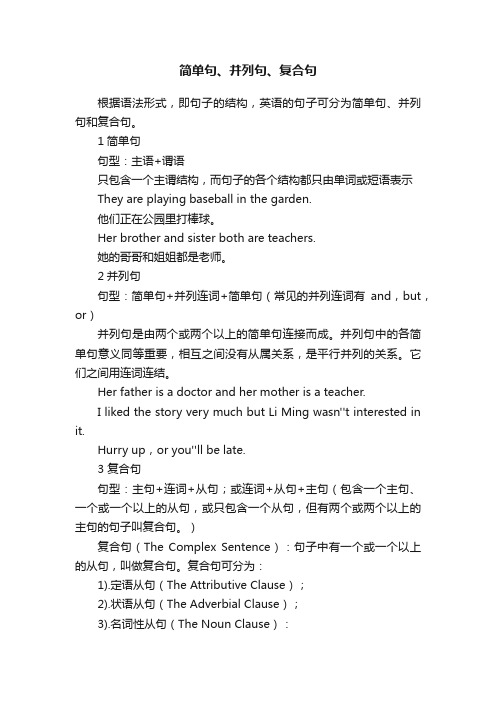
简单句、并列句、复合句根据语法形式,即句子的结构,英语的句子可分为简单句、并列句和复合句。
1简单句句型:主语+谓语只包含一个主谓结构,而句子的各个结构都只由单词或短语表示They are playing baseball in the garden.他们正在公园里打棒球。
Her brother and sister both are teachers.她的哥哥和姐姐都是老师。
2并列句句型:简单句+并列连词+简单句(常见的并列连词有and,but,or)并列句是由两个或两个以上的简单句连接而成。
并列句中的各简单句意义同等重要,相互之间没有从属关系,是平行并列的关系。
它们之间用连词连结。
Her father is a doctor and her mother is a teacher.I liked the story very much but Li Ming wasn''t interested in it.Hurry up,or you''ll be late.3 复合句句型:主句+连词+从句;或连词+从句+主句(包含一个主句、一个或一个以上的从句,或只包含一个从句,但有两个或两个以上的主句的句子叫复合句。
)复合句(The Complex Sentence):句子中有一个或一个以上的从句,叫做复合句。
复合句可分为:1).定语从句(The Attributive Clause);2).状语从句(The Adverbial Clause);3).名词性从句(The Noun Clause):一、定语从句定语从句的定义定语从句在句子中作定语,用来修饰一个名词、名词词组或者代词。
先行词和引导词被修饰的名词、名词词组或代词叫做先行词;在先行词和定语从句之间起连接作用的词叫做引导词。
引导词分为“关系代词”和“关系副词”。
关系代词和关系副词关系代词有:who, whom, whose, that, which, as。
中考英语复合句与并列句练习题50题带答案解析
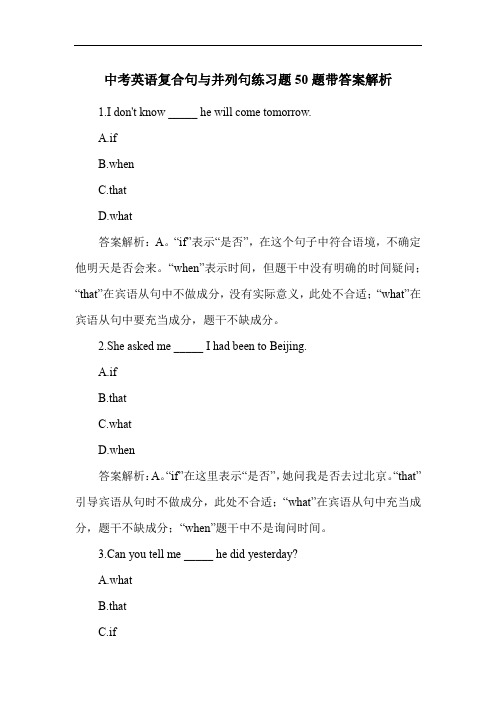
中考英语复合句与并列句练习题50题带答案解析1.I don't know _____ he will come tomorrow.A.ifB.whenC.thatD.what答案解析:A。
“if”表示“是否”,在这个句子中符合语境,不确定他明天是否会来。
“when”表示时间,但题干中没有明确的时间疑问;“that”在宾语从句中不做成分,没有实际意义,此处不合适;“what”在宾语从句中要充当成分,题干不缺成分。
2.She asked me _____ I had been to Beijing.A.ifB.thatC.whatD.when答案解析:A。
“if”在这里表示“是否”,她问我是否去过北京。
“that”引导宾语从句时不做成分,此处不合适;“what”在宾语从句中充当成分,题干不缺成分;“when”题干中不是询问时间。
3.Can you tell me _____ he did yesterday?A.whatB.thatC.ifD.when答案解析:A。
“what”在宾语从句中充当宾语成分,你能告诉我他昨天做了什么。
“that”不做成分,不合适;“if”表示“是否”,不符合语境;“when”题干不是询问时间。
4.We wonder _____ he will come to the party.A.ifB.whenC.thatD.what答案解析:A。
“if”表示“是否”,我们想知道他是否会来参加聚会。
“when”题干中没有时间疑问;“that”不做成分,不合适;“what”题干不缺成分。
5.I want to know _____ you like English.A.ifB.thatC.whatD.when答案解析:A。
“if”表示“是否”,我想知道你是否喜欢英语。
“that”不做成分,此处不合适;“what”题干不缺成分;“when”题干不是询问时间。
6.He said _____ he was busy.A.thatB.ifC.whatD.when答案解析:A。
简单句、并列句和复合句(包括五大句型)
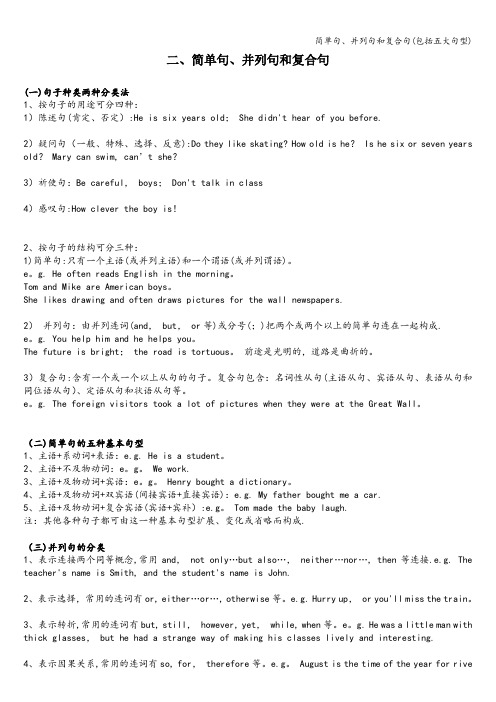
二、简单句、并列句和复合句(一)句子种类两种分类法1、按句子的用途可分四种:1)陈述句(肯定、否定):He is six years old; She didn't hear of you before.2)疑问句(一般、特殊、选择、反意):Do they like skating? How old is he? Is he six or seven years old? Mary can swim, can’t she?3)祈使句:Be careful, boys; Don't talk in class4)感叹句:How clever the boy is!2、按句子的结构可分三种:1)简单句:只有一个主语(或并列主语)和一个谓语(或并列谓语)。
e。
g. He often reads English in the morning。
Tom and Mike are American boys。
She likes drawing and often draws pictures for the wall newspapers.2)并列句:由并列连词(and, but, or等)或分号(;)把两个或两个以上的简单句连在一起构成.e。
g. You help him and he helps you。
The future is bright; the road is tortuous。
前途是光明的,道路是曲折的。
3)复合句:含有一个或一个以上从句的句子。
复合句包含:名词性从句(主语从句、宾语从句、表语从句和同位语从句)、定语从句和状语从句等。
e。
g. The foreign visitors took a lot of pictures when they were at the Great Wall。
(二)简单句的五种基本句型1、主语+系动词+表语:e.g. He is a student。
高三英语复合句与并列句的结构与功能分析练习题50题

高三英语复合句与并列句的结构与功能分析练习题50题1. We are interested in ______ he will come to the party.A.ifB.whetherC.thatD.when答案:B。
“if”和“whether”都有“是否”的意思,但在引导宾语从句且放在介词后时只能用“whether”。
“that”在宾语从句中无实际意义,不表示“是否”。
“when”表示“什么时候”,不符合题意。
本题考查的是宾语从句中“whether”的特殊用法。
2. ______ he said at the meeting surprised us all.A.WhatB.ThatC.WhichD.Who答案:A。
“what”在名词性从句中可以充当主语、宾语、表语等成分,在本句中“what he said at the meeting”是主语从句,“what”在从句中作“said”的宾语。
“that”在名词性从句中不充当成分,只起连接作用。
“which”表示“哪一个”,“who”表示“谁”,都不符合题意。
本题考查的是主语从句中“what”的用法。
3. I don't know ______ he is a teacher or not.A.ifB.whetherC.thatD.when答案:B。
“if”不能和“or not”连用,“whether...or not”是固定搭配。
“that”在宾语从句中无实际意义,不表示“是否”。
“when”表示“什么时候”,不符合题意。
本题考查的是宾语从句中“whether”与“or not”的搭配。
4. The question is ______ we can finish the work on time.A.thatB.whatC.howD.when答案:C。
“that”在表语从句中不充当成分,只起连接作用,本句中不缺连接词,缺的是表示方式的“how”。
高考英语复合句与并列句分析练习题30题带答案解析

高考英语复合句与并列句分析练习题30题带答案解析1.The book that I borrowed from the library is very interesting.A.whichB.whoC.whomD.when答案解析:A。
本题考查定语从句引导词。
先行词是“book”,是物,在从句中作宾语,所以用“which”或“that”引导。
“who”和“whom”用于引导先行词是人时的定语从句;“when”用于引导先行词是时间的定语从句。
2.The man who/whom you met yesterday is my teacher.A.whichB.whoseC.whenD.who/whom答案解析:D。
先行词是“man”,是人,在从句中作宾语,所以用“who”“whom”或“that”引导。
“which”用于引导先行词是物时的定语从句;“whose”表示所属关系;“when”用于引导先行词是时间的定语从句。
3.The house whose roof is red is very beautiful.A.whichB.whoC.whoseD.whom答案解析:C。
先行词是“house”,在从句中“roof”与“house”是所属关系,所以用“whose”引导。
“which”用于引导先行词是物时的定语从句;“who”和“whom”用于引导先行词是人时的定语从句。
4.This is the place where I was born.A.whichB.whoC.whoseD.where答案解析:D。
先行词是“place”,在从句中作地点状语,所以用“where”引导。
“which”用于引导先行词是物时的定语从句;“who”和“whom”用于引导先行词是人时的定语从句;“whose”表示所属关系。
5.The girl who is singing is my sister.A.whichB.whoC.whomD.when答案解析:B。
中考英语简单句并列句复合句考点讲解及练习

简单句、并列句和复合句考点一简单句1.简单句只包含一个主谓结构.2.五种简单句:1)主+谓. He comes at last.2)主+系+表. She is a teacher.The soup tastes nice.3)主+谓+宾. They reached the village.4)主+谓+间宾+直宾. He gave me a pen.5)主+谓+宾+宾补. I find that book very useful.考点二并列句并列句:两个或两个以上的简单句,用连词连接起来;常用的连接词有:1.表示顺承关系的:and, not only…but also不仅….而且….等;She ______ gave us a lot of advice, _______ helped us to overcome difficulties.Linda tried to become an excellent teacher, _____ at last she succeeded.2.表示选择关系和否定条件的有or还是,否则Do you want to leave now ____ would you rather set off laterWear your coat, ____ you’ll catch a cold.3.表示转折关系的有but, yet等;He is young, but he works hard.虽然他年轻,但工作努力;4.表示因果关系的有for, so 等;My leg hurts so I go to see a doctor. 我的腿疼,因此我去看医生;考点三主从复合句:宾语从句1.宾语从句的引导词1引导陈述句用 that在口语和非正式文体中常常省略He tells me that he is going shopping this Sunday.2 引导一般疑问句用if或whether.She asked me if\ whether she could join us. whether…or not3 引导特殊疑问句,要用原来的特殊疑问词;She asked them what they were doing.2.宾语从句的语序:要用陈述句语序;I want to know when the train left.3. 宾语从句的时态1主句是一般现在时,一般将来时或祈使句,宾语从句可根据实际需要选用各种时态;He tells us that he has been able to look after himself.(2)主句是过去时态,宾语从句应使用过去时的相应时态;They said that they had already finished the work.(3)如果宾语从句叙述的是客观事实、真理、自然现象等,不管主句用什么时态,从句都用一般现在时;He said that light travels faster than sound.3. 练习1She asked me, “Will you go to the cinema tomorrow”改为含宾语从句的复合句She asked me______ I ______ go to the cinema the next day.2 How lovely the dog is Can you tell me _____A. where did you get itB. where will you get itC. where you got it3 --- Can you tell me _____ your parents at home--- I often wash clothes and sweep the floor.A.how will you helpB. how you helpC. how will you helpD. howdo you help4 When I was young, my grandfather told me that the sun ______ rise in the east.考点四状语从句一、状语从句在复合句中作状语,修饰主句中的动词、形容词、副词等;1.地点状语从句地点状语从句通常由 where 引导;Put all the things _____they were.A. whereB. whenC. whoseD. which2.时间状语从句主句用将来时,从句用一般现在时时间状语从句的引导词有when, before, after, until, as soon as, since, while, as 等She was cooking when someone knock at the door.What will you do after you finished your homework3.条件状语从句在条件状语从句中,常用的引导词有if, unless等;If it dosen’t rain, I” ll go fishing.They will have a picnic unless it rains next Sunday.4.原因状语从句原因状语从句常用的引导词有because, as, since既然等He didn’t come because he was ill.Since we are students, we should study hard.Because 和so 不能在一个句子中同时使用;5. 结果状语从句结果状语从句主要由so…that…, such…that…引导;It’s so hot that we want to go swimming.That’s such an interesting story that everybody likes it.So… that…与简单句之间的句型转换1)that后的句子是否定句,常用too…to进行转换;He is so young that he can’t go to school. he is too young to go to school.2)that后的句子是肯定句;常用enough to 进行转换;The shirt was so cheap that he bought it. the shirt was cheap enough for him to buy.6.目的状语从句目的状语从句常用的引导词有so that, in order that 等 in order to 简单句Please say it in a loud voice so that everyone can hear it.He works harder in order that he can go to a good college.7. 让步状语从句引导词有though, although, even if, even though尽管等;He often helps others though\ although he is not rich.They will stand by you even if you don’t succeed.Though, although与but 不能同时出现在一个句子中8.比较状语从句比较状语从句由than, as…as…, not as\so… as等引导;比较级He is more outgoing than I.He ran as fast as Mike.二、练习1. It’s quite common in Britain to say “thank you”to the drivers _____ people get off the bus.a. afterb. sincec. untild. when2. The art club is for members only. You can’t go in ____you are a member.a. unlessb. becausec. ifd. though3. Now many parents send their children to foreign countries, _____ they want them to get a better education.a. untilb. thoughc. because4. ---- What would some students like to do after finishing their education---- They would like to start to work_______ they needn’t depend on their parents completely.a. as soon asb. so thatc. befored. while考点五定语从句修饰某一名词或代词的从句叫定语从句;被定语从句修饰的词叫先行词,引导定语从句的词叫关系词关系代词和关系副词;1.关系代词的基本用法The man __________spoke at the meeting is from Hong Kong. 指人作主语The building ___________is being built will be used as a hospital.指物作主语I visited a scientist _______ name is known all over the world. 指人作定语2. 关系代词特殊用法1当关系代词在从句中作主语时,从句的谓语动词要与先行词保持一致;He is one of the boys who ______ like playing football.He is the only one of the boys who________ like playing football.2 通常以下四种情况关系代词只能用that而不能用which.1 先行词为all, much, something, everything, nothing, little, none, the one 等不定代词时2先行词被形容词最高级修饰时;3当先行词被the only, the very, the just等修饰时;4先行词中既有人又有物时;3. 关系副词的基本用法;1 when 在句中作状语,表示时间;2 where 在句中作状语,表示地点;.3 why 在句中作状语,表示原因;He remembers the day _______ he joined the League.This is the reason_______ he is late today.This is the place _______ Lu Xun was born.1. 2011泰安--- _______do you read English newspapers---I read China Daily every day.A. How longB. How soonC. How oftenD. How far2.2011抚州John had a short walk after lunch, _______A. did heB. didn't heC. had heD. hadn't he3.2011宁波--- _______do you have an Art Festival in your school---Once a year.A. How longB. How oftenC. How farD. How soon4.2011安徽省If you want to go to see the movie this evening, so _______I.A. doB. amC. willD. should5.2011长沙 _______tall the girl isA. HowB. HowaC. WhatD. What a6.2011长沙 _______ call me Mimi It's my cat's name.A. NotB. Didn'tC. Doesn'tD. Don't7.2011长沙They went to the park yesterday,_______A. don't theyB. didn't theyC. aren't theyD. can't they8.2011福州---Li Mei usually helps others, _______---Yes, she is kind-hearted.A. does sheB. is sheC. doesn't she9.2011眉山There _______an English party in our school tomorrow evening.A. haveB. will haveC. is going to haveD. will be10. 2011济南--- _______a year does your school have sports meetings---Twice a year.A. How oftenB. How soonC. How longD. How many times11. 2011泰州---I have changed my job.---_______.A. So do IB. So have IC. So I doD. So I have12. 2011济南Mike learns a lot about Internet. And _______.A. I don't, eitherB. so do IC. so am I am, too13. 2011眉山Jim never goes to the movies on Saturday, _______A. does JimB. doesn't JimC. doesn't heD. does he14. 2011玉州You've just finished your listening exam Please getyourself ready for the next part, _______A. shall weB. will youC. do youD. are you15. 2011眉山--- _______the weather like last Monday---It was sunny.A. How wasB. What'sC. What wasD. How is16. 2011潍坊_______great scientist Qian Xuesen isA. HowB. HowaC. WhatD. What a17. 2011眉山--- _______do you visit your grandparents---Once a month.A. How soonB. How longC. How muchD. How often18. 2011内江--- _______ do you speak English so well---Because I practice it with my partner every day.A. WhyB. WhenC. Who19. 2011泉州---We'll go to Qing Yuan Mountain tomorrow. Why _______join us---That's a good idea.A. notB. don'tC. can'tD. didn't20. 2011泉州There is little milk in the glass, _______A. is thereB. isn't thereC. isn't itD. does it21. 2011肇庆The students in Class Two played basketball against ClassOne yesterday,_____A. did theyB. didn't theyC. weren't they22. 2011宁波---What a new computer Can you tell me_______---Just the day before yesterday.A. how much you paid for itB. how much did you pay for itC. when you bought itD. when did you buy it23. 2011泰安---Tom wants to know if you will have a picnic tomorrow.---Yes. But if it _______, we'll play chess instead.A. will rainB. rainedC. is rainingD. rains24. 2011烟台---Do you know this dictionary belongs to---Let me see. Oh, it's_______.A. who does; mineB. who; meC. whose; mineD. who; mine25. 2011杭州Franklin told them all _______to be in Britain again.A. he was how happyB. how happy he wasC. how was he happyD. he was happy how26. 2011湖州---What kind of movies do you like---I like the movies_______ are about Chinese history.A. whoB. whomC. whoseD. that27. 2011丽水---Do you know _______---Sorry, I don't have a watch.A. whose watch this isB. whose watch is thisC. what time it isD. what time is it28. 2011重庆The woman asked the policeman where _______.A. the post office isB. the post office wasC. is the post officeD. was the post office29. 2011泰安---Can you guess_______ the new schoolbag yesterday.----Sorry, I've no idea.A. how much did he pay forB. how much he spentC how much he paid for D. how much did he spend30. 2011杭州Who is the man_______ is reading a book over thereA. thatB. whichC. whoseD. what31. 2011湖州---Do you know_______---Next Sunday.A. what they will doB. where they will doC. when they will come hereD. who they will meet32. 2011长沙---Can you tell me why_______---Because I want to help the people there.A. do you go to Tibet西藏B. did you go to TibetC are you going to Tibet D. you are going to Tibet33. 2011浙江省---Linda, could you tell me _______---He is an actor.A. what he doesB. what does he doC where he works D. where does he work34. 2011福州---Could you tell me _______---Sure. The day after tomorrow.A. when will you leave for the U.S.A.B. when Mr. Lee will comeC when your father returned35. 2011济南He asked me_______.A. who did kick the first goal in the World CupB. when was the A. PEC meeting heldC when China became a member of the WTOD. where will the 2008 Olympics be held36. 2011玉州Jane is one of the students in the class _______ have everbeen to China.A. whoB. whoseC. whichD. whom37. 2011济宁Can you tell me _______after this examA. what you didB. what did you doC. what will you doD. what you will do38. 2011苏州---Can you tell me how many colours _______ in a rainbow---SevenA. there areB. are thereC. they areD. are they39. 2011潍坊I can't understand _______Apple's iPad 2.A. why are they so mad aboutB. why they are so mad aboutC. how are they so mad aboutD. how they are so mad a。
简单句、并列句和复合句(1)解析
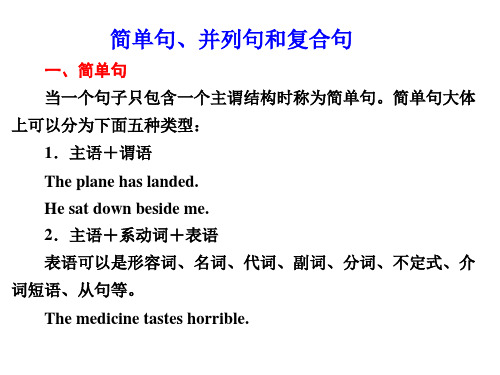
②地点状语从句通常由where,wherever等 引导。如:
I will never forget to catch the thief who stole my necklace wherever he may be.
③原因状语从句通常由because,since,as 等引导。
④目的状语从句通常由so that...,so...that..., in order that...等引导。
⑧条件状语从句通常由if,unless,as long as等引导。
感悟高考
1.I refuse to accept the blame for something B was
someone else’s fault.
(2010·全国Ⅱ,16)
A.who B.that C.as D.what
解析 句意为:我拒绝接受因别人的错误而对我进行的指责。
C.where
D.which
解析 空格引导的是case作先行词的定语从句,且在从句中
作地点状语。句意为:你能给我一个能用上这个词组的情
形吗?
6.It is a good idea to ask for a map at the information center,
B may prove to be very useful before you start your
带着笔,以防有重要的东西要写下来。in case表示“以防”。
2. A scientists know where a storm will happen,winds
will suddenly change,carrying the storm to a new direction.
英语语法之句子类型(简单句、并列句、复合句)
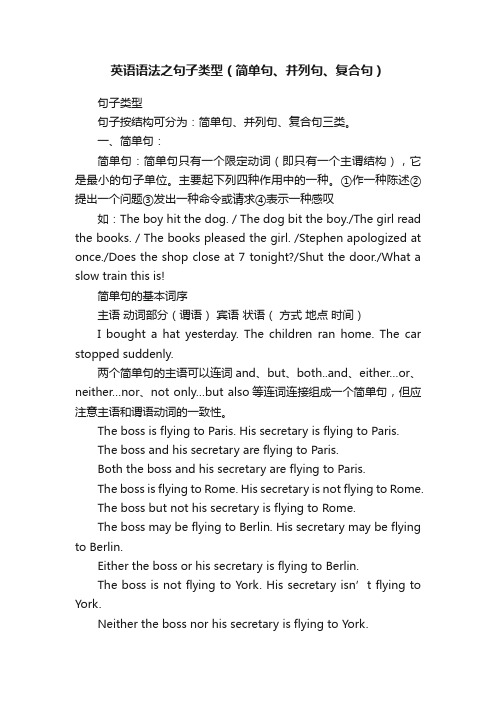
英语语法之句子类型(简单句、并列句、复合句)句子类型句子按结构可分为:简单句、并列句、复合句三类。
一、简单句:简单句:简单句只有一个限定动词(即只有一个主谓结构),它是最小的句子单位。
主要起下列四种作用中的一种。
①作一种陈述②提出一个问题③发出一种命令或请求④表示一种感叹如:The boy hit the dog. / The dog bit the boy./The girl read the books. / The books pleased the girl. /Stephen apologized at once./Does the shop close at 7 tonight?/Shut the door./What a slow train this is!简单句的基本词序主语动词部分(谓语)宾语状语(方式地点时间)I bought a hat yesterday. The children ran home. The car stopped suddenly.两个简单句的主语可以连词and、but、both..and、either…or、neither…nor、not only…but also等连词连接组成一个简单句,但应注意主语和谓语动词的一致性。
The boss is flying to Paris. His secretary is flying to Paris.The boss and his secretary are flying to Paris.Both the boss and his secretary are flying to Paris.The boss is flying to Rome. His secretary is not flying to Rome.The boss but not his secretary is flying to Rome.The boss may be flying to Berlin. His secretary may be flying to Berlin.Either the boss or his secretary is flying to Berlin.The boss is not flying to York. His secretary isn’t flying to York.Neither the boss nor his secretary is flying to York.两个简单句的宾语可由and、both…and等连词连接组成一个简单句。
五大句型结构及练习题
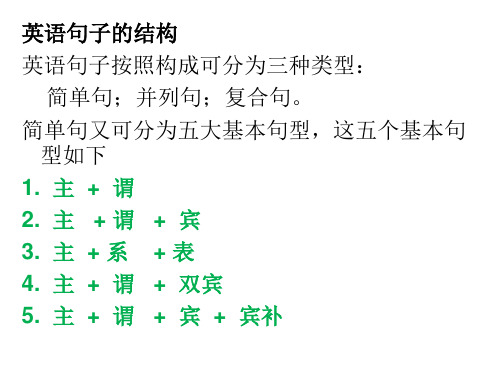
4. 状态系动词(表明主语的状态、身份、特征)
只有be的各种形式 1) He is a teacher. 他是一名教师。 2) They are hard-working. 他们很努力工作。 自己造句
分析下面的句子结构 1. Your food looks delicious. 2. Can I have some noodles? 3. No one will look after you. 4. She likes animals. 5. We called her Xi Wang. 6. I brought him some good books. 7. Giant pandas are in danger now. 8. People find it useful to do regular exercise. 9. The number is getting smaller and smaller. 10. The study begins next month.
英语句子的结构 英语句子按照构成可分为三种类型: 简单句;并列句;复合句。 简单句又可分为五大基本句型,这五个基本句 型如下 1. 主 + 谓 2. 主 + 谓 + 宾 3. 主 + 系 + 表 4. 主 + 谓 + 双宾 5. 主 + 谓 + 宾 + 宾补
1. 主语+谓语
此句型的特点是:谓语动词是不及物动词,本身能 表达完整的意思,后面不需跟宾语,但有时可跟 副词、介词短语等作状语 1. Birds can fly. 鸟会飞。 2. It happened in June 1932. 这件事发生于一九三年六月。 3. My watch stopped. 我的表停了。
- 1、下载文档前请自行甄别文档内容的完整性,平台不提供额外的编辑、内容补充、找答案等附加服务。
- 2、"仅部分预览"的文档,不可在线预览部分如存在完整性等问题,可反馈申请退款(可完整预览的文档不适用该条件!)。
- 3、如文档侵犯您的权益,请联系客服反馈,我们会尽快为您处理(人工客服工作时间:9:00-18:30)。
七年级上册:Unit 1—Unit 9:侧重于陈述句和疑问句。
七年级下册:Unit 4:祈使句 Don't eat in the classroom.Unit 8:倒装句 There is a zoo in my neighborhood.Unit 2,Unit 3,Unit 5,Unit 9,Unit 11,Unit 12:特殊疑问句。
八年级上册:Unit 7:There will be more people. There will be more pollution.Unit 8:First,peel the bananas. Next, put the bananas in the blender. Then, pour the milk into the blender. Finally, turn on the blender.八年级下册:Unit 3:For one week, she did not do any housework and neither did I.九年级:Unit 2 :What fun the Water Festival is! How fantastic the dragon boat teams were!一、陈述句和疑问句1.陈述句用来陈述一个事实或表达说话者看法的句子叫“陈述句”,句末用句号表示句子的陈述结束。
陈述句分为肯定句和否定句。
(1)肯定句的基本结构:“主语+谓语+宾语”。
例如:I play basketball after school.(2)否定句又分为完全否定和部分否定。
①完全否定词有not,no,no one,nobody,nothing,neither,none,never。
例如:None of us have been to Canada.②部分否定词有hardly,seldom,few,little以及not与both,all,each,every,quite,always等连用所表示的部分否定。
例如:I can hardly see anything in the all students come to school by bus.2.疑问句用来表示提问的句子叫作“疑问句”,句末用问号。
疑问句包括一般疑问句、特殊疑问句、选择疑问句和反意疑问句4种。
(1)一般疑问句①以系动词be开头的疑问句。
例如:Are you a student②以助动词开头的疑问句。
例如:Do you speak French③以情态动词开头的疑问句。
例如:Can you dance(2)特殊疑问句用特殊疑问词引导的疑问句叫“特殊疑问句”。
特殊疑问词包括疑问代词、疑问副词和由疑问词构成的疑问短语。
①常用疑问代词:what什么;who谁;whom谁(who的宾格);which哪个(些);whose谁的。
例如:What are you doing②常用疑问副词:when何时;where何地;how怎么;why为什么。
例如:Where are you going tomorrow③常用疑问短语:what time什么时刻;how many/much多少;how often多久一次;how soon多久;how long多长时间;how far多远;how old多大(年龄);how big多大。
例如:—How long have you been here—For 10 minutes.(3)选择疑问句用来在两种或两种以上情况中进行选择的疑问句叫作“选择疑问句”。
答语不能用Yes/No回答,而应从问句中选择一种情况进行回答。
①一般选择疑问句的构成:一般疑问句+or+被选择的内容例如:—Are you a teacher or a doctor—I'm a teacher.②特殊选择疑问句的构成:特殊疑问句+A or B例如:Which do you like better,tea or coffee(4)反意疑问句附在陈述句后对陈述内容进行反问的句子叫“反意疑问句”,也叫“附加疑问句”。
反意疑问句前一部分是陈述句,后一部分是简短问句。
陈述部分用逗号结尾,疑问部分用问号结尾。
例如:It's a nice day,isn't it①疑问部分的主语必须与陈述部分的主语一致;当陈述部分的主语是名词或代词时,疑问部分要用相应的人称代词。
例如: comes from the UK,doesn't he②疑问部分要与陈述部分的时态保持一致。
例如:Tom went to the cinema yesterday,didn't he③答语是肯定的用“Yes”;答语是否定的用“No”。
前否后肯的反意疑问句的答语yes译为“不”,no译为“是的”。
例如:—Ann didn't come to school last week,did she—No,she didn' was ill.特别提醒反意疑问句的特殊形式①陈述部分是I am...,疑问部分用aren't I。
例如:I'm your best friend,aren't I②当陈述部分是there be结构时,疑问部分用there。
例如:There are many birdsin the tree,aren't there③当陈述部分的主语是指示代词this,that时,疑问部分的主语用it;当陈述部分的主语是these或those时,疑问部分的主语用they。
例如:This is an English car,isn't it These are Russian planes,aren't they④当陈述部分含有never/nothing/none/no one/seldom/hardly/few/little等否定词时,疑问部分用肯定形式。
例如:She has never been abroad,has she⑤如果陈述部分含有由否定前缀im-,dis-,un-等构成的否定意义的词,则陈述部分作肯定处理,疑问部分仍用否定形式。
例如:Mary is unhappy,isn't she⑥当陈述部分的主语是不定代词something/anything/everything/nothing等时,疑问部分中代词用it。
例如:Nothing is wrong with the computer,is it⑦当陈述部分的主语为somebody/someone/anybody/anyone/everybody/everyone等时,疑问部分中代词用they或he,注意问句动词的数应与they/he保持一致。
例如:Everyone has known the news,hasn't he/haven't they⑧祈使句的反意疑问句a.祈使句是肯定形式,其反意疑问句中的疑问部分用will you或 won't you皆可。
例如:Be sure to write to us,will/won't youb.祈使句是否定形式,其反意疑问句中的疑问部分通常只用will you。
例如:Don't smoke in the meeting room,will youc.以let开头的祈使句构成反意疑问句时, let's用shall we构成反意疑问句,其他均用will you。
例如:Let's take a walk after supper,shall we Let the boy go first,will you⑨当陈述部分是I think/I suppose/I believe/I consider等结构时,疑问部分一般与从句保持一致。
注意“否定前移”。
例如:I think you can do it better next time,can't you I don't believe there will be robots at people's homes,will there二、感叹句1.以what引导(1)What + a/an +adj.+单数可数名词 + 主语 + 谓语!例如:What a beautiful mountain it is!(2)What +adj.+可数名词复数 + 主语 + 谓语!例如:What great inventions he has made!(3)What +adj.+不可数名词 + 主语 + 谓语!例如:What bad weather it is today!2.以how引导(1)How +adj. +a/an+可数名词单数+主语+谓语!例如:How clever a boy he is!(2)How +adj./adv.+主语+谓语!例如:How quickly Tom runs!三、祈使句祈使句表达说话人对对方的劝告、叮嘱、建议、请求或命令等。
主语you通常省略,谓语动词用原形,句末用感叹号或句号。
表达请求或劝告时,祈使句句末或句首可以加上please表示委婉的语气。
1.肯定祈使句(1)Do型:动词原形(+宾语)+其他成分。
例如:Please have a seat.(2)Be型:Be+表语(名词或形容词)+其他成分。
例如:Be quiet.(3)Let型:Let+宾语+动词原形+其他成分。
例如:Let me help you.2.否定祈使句(1)Do型和Be型的否定式都是在句首加don't构成。
例如:Don't forget me! Don't be late for school!(2)Let型的否定式有两种:“Don't +let+宾语+动词原形+其他成分”和“Let+宾语+not+动词原形+其他成分”。
例如:Don't let him go./Let him not go.(3)有些可用no开头,用来表示禁止。
例如:No smoking!四、倒装句英语句子一般主语在前,谓语在后。
但有时因为语法结构的要求或为了表达特殊的强调部分,会把句中的谓语提到主语前面,这种句子叫“倒装句”。
倒装句的常见句式: be句型(1)There be句型表示“存在”,主语在be的后面。
例如:There is some coffee in the cup.特别提醒there be与have的区别①There be结构表示“某地有某人/某物”,强调客观存在。
②have表示“(某人)拥有某物”,强调所属关系。
